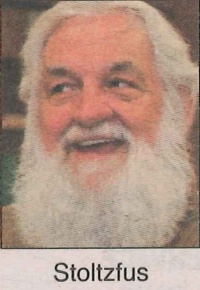If this site was useful to you, we'd be happy for a small donation. Be sure to enter "MLA donation" in the Comments box.
Stoltzfus, Gene (1940-2010)
Mennonite Weekly Review obituary: 2010 Mar 22 p. 1, 7
Birth date: 1940
text of obituary:
By Celeste Kennel-Shank
Mennonite Weekly Review
CHICAGO — Gene Stoltzfus, founding director of Christian Peacemaker Teams and an international human rights activist, died March 10. He was 70.
His heart stopped while he was riding his bicycle near his home in Fort Frances, Ont.During his tenure as CPT director from 1988 to 2004, Stoltzfus helped establish an organization for the peace churches and other Christians with a vision that peacemakers ought to be willing to take risks to stop violence.
His 45-year career included years of service in Vietnam and the Philippines, as well as directing U.S.-based peacebuilding organizations. Stoltzfus traveled to numerous conflict zones and contributed to training hundreds of peacemakers.
In the early 2000s, he visited Afghanistan, Pakistan and Iraq, listening to survivors of war and learning about the effects of armed conflict there.
Stoltzfus led CPT as it carried out international projects in places such such [sic] as Chiapas, Mexico, and Haiti, as well as work in U.S. cities, including Richmond, Va., and Washington.
Tears and laughter mingled as Stoltzfus' colleagues in the CPT office remembered him.
Kryss Chup, CPT training and publications coordinator, who worked with Stoltzfus for 27 years in three organizations, saw Stoltzfus as a visionary.
"Gene brought together a unique combination of that vision with profound grassroots experience," she said. "The vision had a comprehensive practicality about it as well."
Some CPT workers remember receiving phone calls from "God" with a deep voice on the other end asking them to consider taking part in a CPT project. They then realized it was Stoltzfus.
"It was one of Gene's humorous ways of connecting to the heart of people," Chupp said.
Stoltzfus modeled nonviolence in love of those who could be seen as enemies, Chupp said.
"I saw this over and over and over again when he was engaged with authority figures or those seen as the opponents, and he just broke through," she said.
